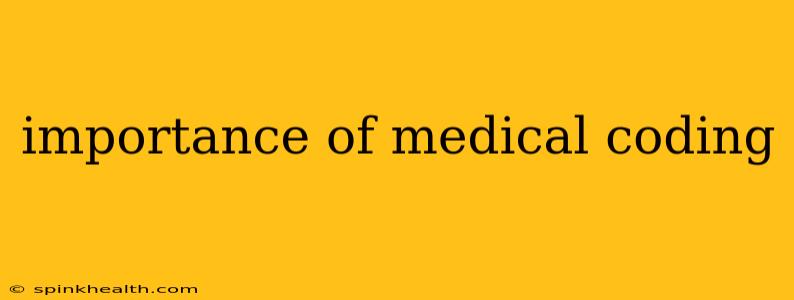Have you ever wondered how hospitals, doctors' offices, and insurance companies communicate the intricate details of a patient's healthcare journey? The answer lies in the meticulous world of medical coding. It's the silent language that translates medical procedures, diagnoses, and treatments into numerical and alphanumeric codes, forming the backbone of efficient healthcare billing and administration. Without it, the healthcare system as we know it would crumble. But its importance goes far beyond just billing; it's a crucial element in data analysis, research, and ultimately, improving patient care.
Let's embark on a journey to understand the vital role medical coding plays in our healthcare ecosystem.
What is Medical Coding and Why is it Important?
Medical coding is the process of transforming medical diagnoses, procedures, and services into standardized codes using systems like ICD (International Classification of Diseases) and CPT (Current Procedural Terminology). Think of it as a universal translator for the healthcare industry. These codes are the language understood by insurance companies, allowing for accurate claim processing and reimbursement. Without precise coding, claims are rejected, leading to financial hardship for providers and delays in patient care.
How Does Medical Coding Affect Healthcare?
Medical coding's impact is far-reaching:
-
Accurate Billing and Reimbursement: This is perhaps the most obvious benefit. Correct coding ensures healthcare providers receive timely and accurate payments for services rendered. Incorrect coding can lead to underpayment or even denial of claims, impacting the financial health of practices and hospitals.
-
Data Analysis and Research: The coded data creates a massive dataset, providing invaluable insights for researchers and healthcare administrators. This information can be used to track disease trends, evaluate the effectiveness of treatments, and identify areas needing improvement in healthcare delivery. It helps us understand public health challenges on a larger scale.
-
Improved Patient Care: By providing accurate and detailed information about patient diagnoses and treatments, medical coding contributes to better patient care. This data allows healthcare professionals to monitor patient outcomes, identify potential risks, and make informed decisions about treatment plans. Imagine trying to track a patient's progress without this structured information system – it would be a logistical nightmare.
-
Public Health Surveillance: Medical coding is crucial for tracking and monitoring public health trends. By analyzing coded data, health officials can identify outbreaks, monitor the spread of infectious diseases, and develop effective public health interventions. This is particularly crucial during pandemics or outbreaks of new illnesses.
-
Compliance and Auditing: Accurate coding is essential for complying with regulatory requirements and avoiding penalties. Regular audits rely on this coded data to ensure transparency and compliance with healthcare laws and regulations.
What are the Different Types of Medical Coding?
There are several types of medical coding, each serving a specific purpose:
-
Diagnosis Coding (ICD-10-CM): This system categorizes diagnoses, symptoms, and conditions.
-
Procedure Coding (CPT): This system classifies medical, surgical, and diagnostic procedures.
-
HCPCS (Healthcare Common Procedure Coding System): This system includes codes for supplies, equipment, and other healthcare services not covered by CPT.
How Accurate is Medical Coding?
The accuracy of medical coding is paramount. Even small errors can have significant financial and clinical implications. That's why certified medical coders undergo rigorous training and adhere to strict guidelines to ensure accuracy. Regular audits and quality control measures are also in place to minimize errors.
What Skills are Needed to Become a Medical Coder?
To become a proficient medical coder requires:
- Medical Terminology Knowledge: Understanding anatomical terms and medical procedures.
- ICD and CPT Coding Systems Mastery: A thorough understanding of the code sets and their application.
- Anatomy and Physiology Knowledge: Fundamental understanding of how the body functions.
- Attention to Detail: Precision is key to avoid errors.
- Strong Analytical Skills: Interpreting medical records requires careful analysis.
The Future of Medical Coding
With the rise of electronic health records (EHRs), medical coding is evolving. While the fundamentals remain the same, the integration of technology is improving efficiency and accuracy. However, the human element of careful review and interpretation remains critical to ensure the integrity and accuracy of the data.
In conclusion, medical coding is much more than just numbers and letters; it's the lifeblood of the healthcare system. It fuels accurate billing, drives vital research, and ultimately contributes to better patient care. It’s the unsung hero, working tirelessly behind the scenes to keep the healthcare machine running smoothly.

